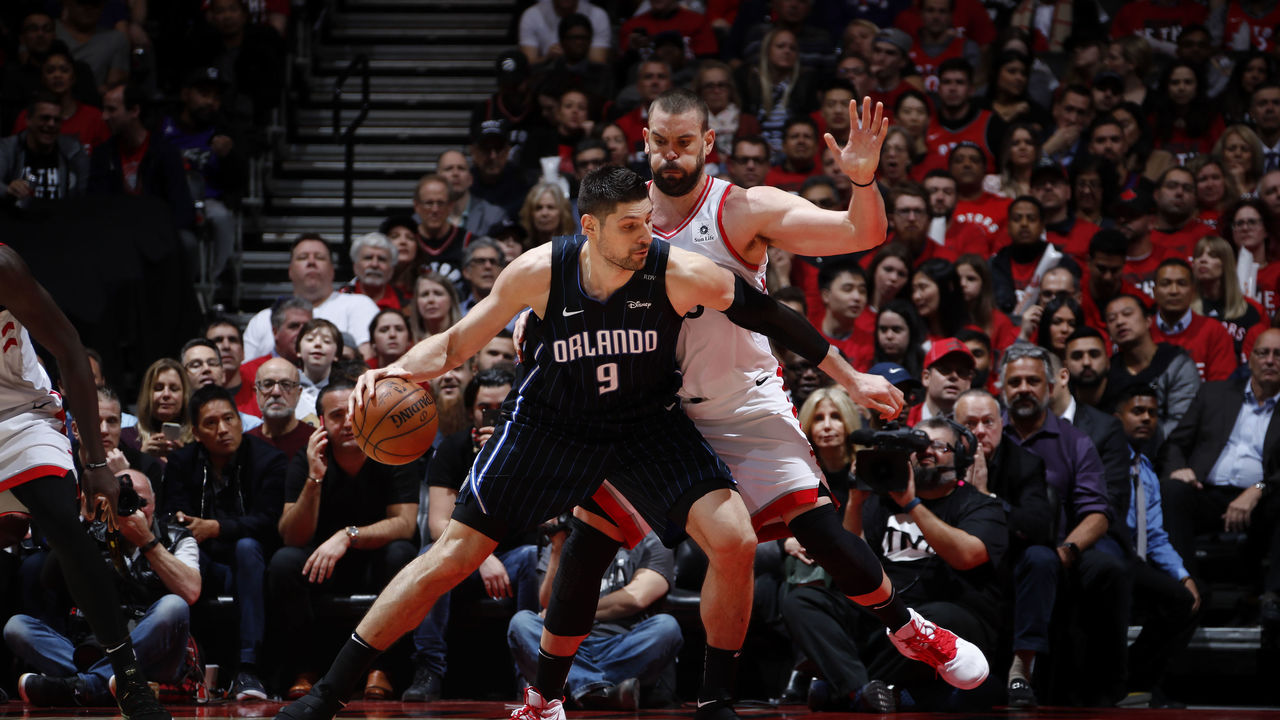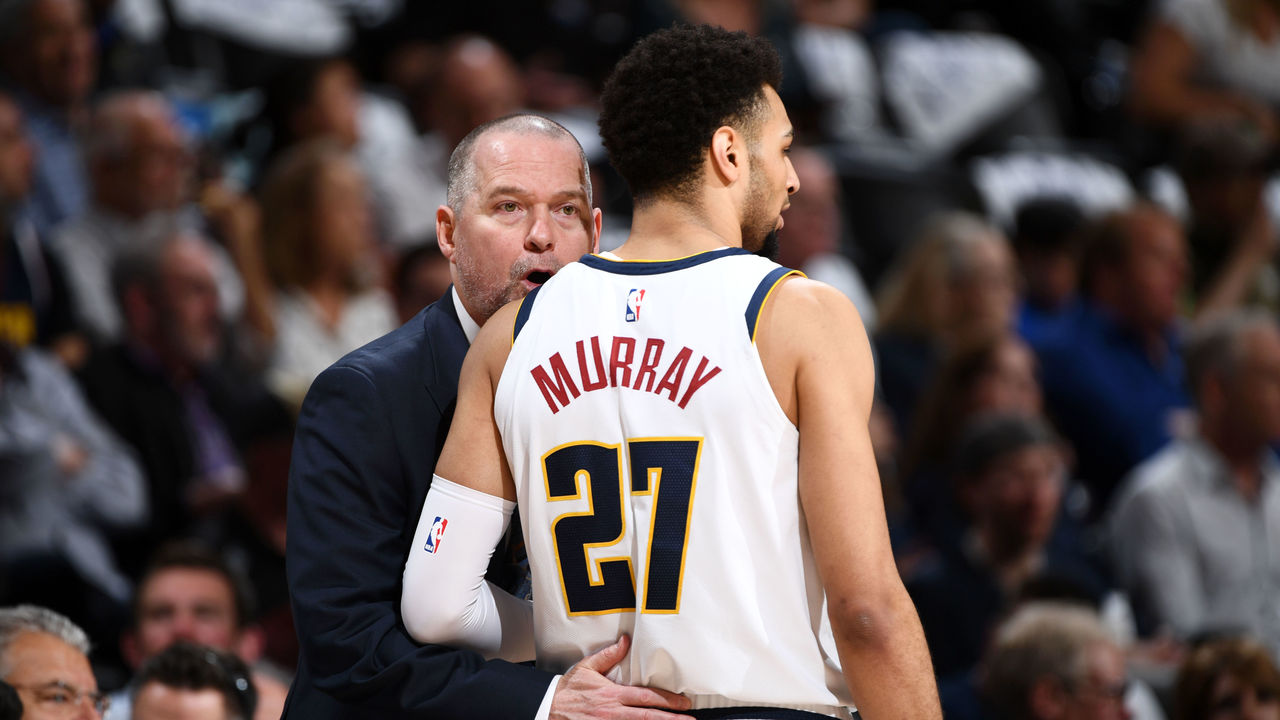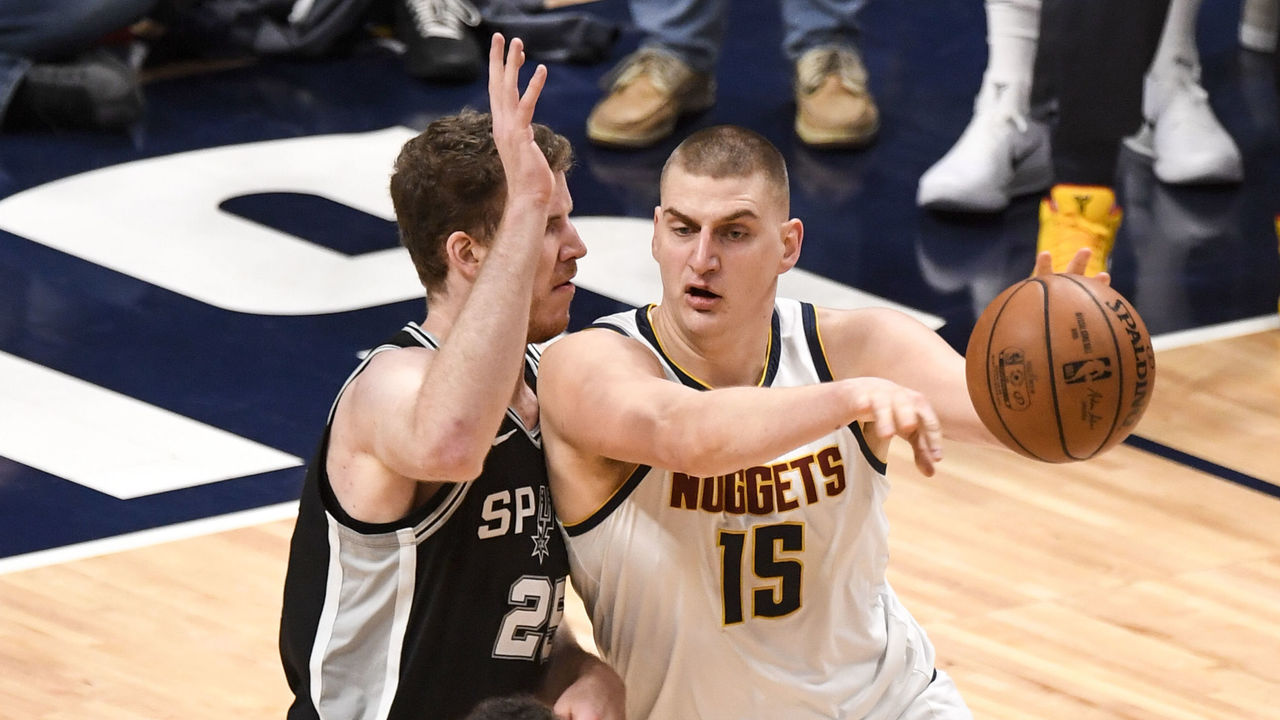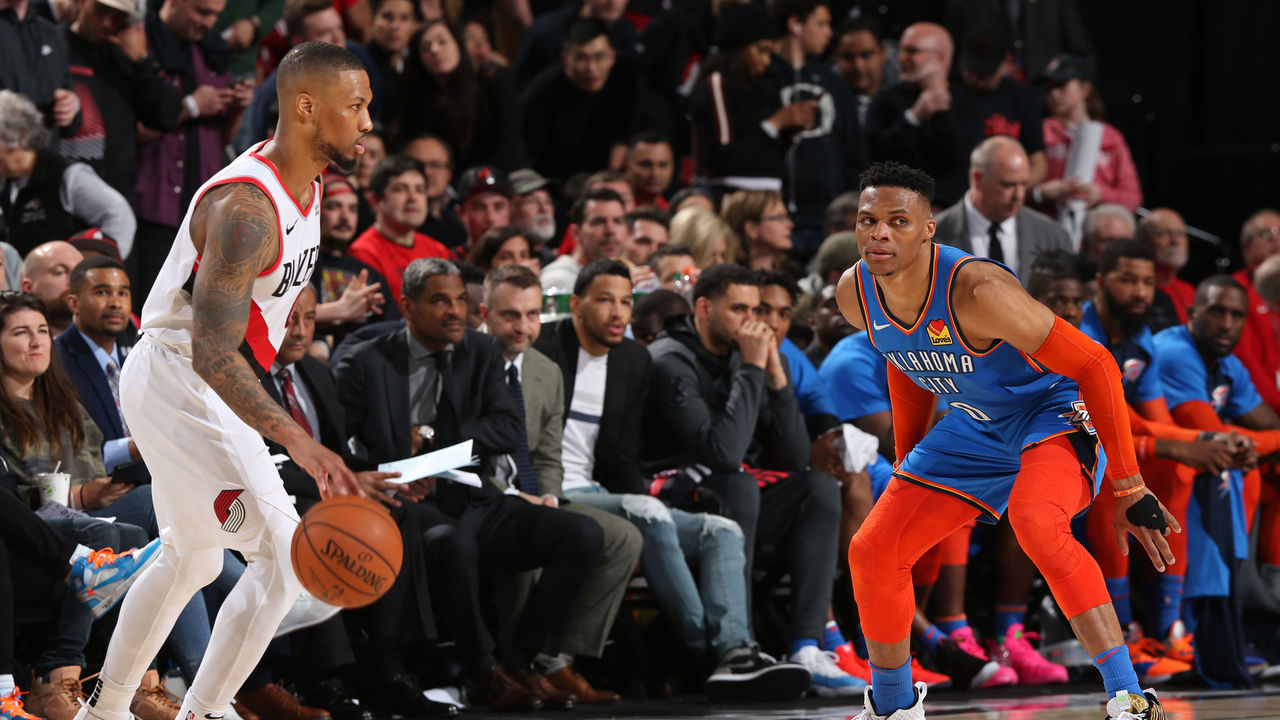Game 2 impressions: Nuggets save their season, Lillard dominates Westbrook
Tuesday night featured a trio of pivotal first-round Game 2s, with the second-seeded Toronto Raptors and Denver Nuggets both leveling up their series with the seventh-seeded Orlando Magic and San Antonio Spurs, respectively, while the Portland Trail Blazers protected home court to take a 2-0 lead on the Oklahoma City Thunder.
Here are four takeaways from the three-game slate:
The Magic need more from Vucevic

Nikola Vucevic had just three minutes of postseason experience coming into this series, and the first-time All-Star has been completely blanketed through two games. He was invisible for most of Tuesday night, and the Magic's offense cratered as a result.
As you might expect when a borderline All-NBAer averages 8.5 points on 36 percent true shooting through two games, there's plenty of blame and credit to go around. Credit the Raptors' defense - particularly Marc Gasol - for the way they've game-planned and kept Vucevic in check. Blame both Vucevic and the Magic for not working harder to get him going.
One thing that clearly hasn't been working is having Vucevic try to create against Gasol in the post. That's a huge part of the big man's game that Gasol has managed to neutralize, but considering Vucevic is an ultra-versatile player, Orlando should be able to better utilize him elsewhere, namely in screen-roll actions.
But again, the Raptors deserve credit for how they've defended those actions. They've sealed off pocket passes with hard traps, sent weak-side help early and often to blow up the rim-roll, and had guys stunt at Vucevic when he pops.
It hasn't helped that Vucevic is often playing alongside spotty or unproven shooters. At first glance, the sequence below looks like an opportunity for him to pivot into a post-up against Fred VanVleet, but then you notice Pascal Siakam and Danny Green are both prepared to converge from the weak side, entirely unconcerned with leaving Aaron Gordon or Michael Carter-Williams.
Vucevic probably makes the correct pass to find Wes Iwundu in the corner, but Iwundu has only hit 38 3-pointers in his career, at a 30.4 percent clip. (He's also standing out of bounds.)
Against the Raptors' pressuring defense in Game 2, which brought Gasol way up high on side pick-and-rolls, Orlando should have been able to find more opportunities to get Vucevic rolling to the basket. It happened exactly once on Tuesday, when the Magic emptied out the weak-side corner:
That set worked because there was no one in position to tag Vucevic, but also in large part because the Raptors had Siakam guarding D.J. Augustin, which is something they did a lot of in this game. That left Kyle Lowry guarding Jonathan Isaac in the dunker spot, which meant there was no resistance at the rim. Even if Lowry had arrived earlier to try drawing the charge, the dump-off pass to Isaac would've been wide open.
More than anything, though, it's the pick-and-pop that feels under-utilized so far. The Magic haven't really made Gasol uncomfortable at the defensive end (y'know, aside from that one time), and he's held up in lots of different coverages. But when Vucevic (a 36.4 percent 3-point shooter this season) is popping, it makes both the drop-back and the blitz dicey propositions.
This should be a point of emphasis for the Magic as the series swings back to Orlando. Vucevic is by far their best player, and they'll die a quick death if they can't get him more involved.
Murray and the Nuggets come of age

Two games into what is, for most of their players, a maiden playoff voyage, the Nuggets have already demonstrated all the variables working for and against them. Tuesday's wild come-from-behind win packed the whole spectrum into 48 dizzying minutes. First, the inexperience and uncertainty and timidity; then, the moxie and self-belief and raw ability.
Nearly eight minutes into the third quarter, the Nuggets trailed by 19 and their whole feel-good season hung by a thread. (Taking an 0-2 deficit back to San Antonio, where the Spurs have lost just nine times this season, would've spelled ruin.) To that point, the Nuggets had quite simply been ice cold, just as they'd been in Game 1. The Spurs kept sending double-teams at Nikola Jokic, he kept zipping passes out of those doubles, and his teammates kept missing. Jamal Murray, the team's second-leading scorer, hadn't hit a single shot. He and Will Barton had combined to shoot 1-of-17 from the field and 0-of-7 from deep. A few faint boos drizzled down from the Pepsi Center crowd.
A few things had to happen for the game to turn, none more important than Murray hopping straight from the cryo-freezer into the furnace. But let's work chronologically: Malik Beasley entered the game for Barton, Monte Morris came in for the then-frigid Murray, and the Nuggets finally started getting stops and hitting shots in rapid succession. They ripped off a huge run that trimmed the lead to six in the span of about three minutes, and it started on defense, where they swarmed and swatted and poked, creating a handful of turnovers and a few wild Spurs misses. From there, the typically slow-paced Nuggets made a concerted effort to push, running off almost every live-ball change-of-possession and hunting shots early in the clock when their half-court offense had stalled out.
Paul Millsap had some heroic defensive moments when he guarded three or four guys on a single possession and managed to be everywhere at once - stunting toward a shooter to force a drive, collapsing on the driver to force a kickout, and then closing back out to the 3-point line to force a miss. Jokic did his part with some good, hard hedges that burned the shot clock and produced deflections and steals. Gary Harris pounced on loose balls and ran them back the other way. The game was back within reach.
Then, just before end of the third, head coach Mike Malone went back Murray, who was 0-of-7 from the field and had been getting abused at the defensive end. Murray missed his eighth shot almost immediately upon re-entering (a contested layup off a cut), and then the quarter ended.
Still, Malone stuck with Murray, and all the third-year guard did was hit his first eight shots of the final frame, including two gargantuan pull-up threes in the final two-plus minutes to bust open what had been a one-possession game.
Jamal Murray in GM2
— Ballislife.com (@Ballislife) April 17, 2019
1st 3 quarters: 2 PTS, 0-8 FG
4th quarter: 22 PTS, 8-9 FG#MileHighBasketball pic.twitter.com/JT3K6oEA9S
We've seen Murray get cooking before, and we know how devastating a shot-maker he can be, but to ride or die with him in this game? With the way he was playing? With everything that was at stake? That took some imagining. And a whole lot of faith.
"I was going with him," Malone said afterward. "He needs this. ... I didn't foresee the fourth quarter he was going to have, but I knew in my heart he needed to get these minutes. I needed to show him that I believed in him. That's powerful. I had to stay with Jamal, make or miss, because he's our guy."
Hindsight is 20/20, sure, but that's the kind of ethos you want guiding a wide-eyed young team getting its first taste of the postseason. That emotional intelligence is an element of coaching that, in our constant haste to dissect rotations and schemes and play calls, we probably don't talk about enough. It just saved Denver's season (for now).
Poeltl power

A big part of how the Spurs built their lead in the first place was the diligent work of young center Jakob Poeltl.
Poeltl's fit with the Spurs is a bit tenuous because LaMarcus Aldridge is basically a center at this point, and it's really difficult to space the floor with both of them out there together - especially when inside-the-arc operator DeMar DeRozan is also on the floor. But Poeltl is easily San Antonio's best defensive big, and he's quietly done an excellent job on Jokic any time he's gotten a crack at the Nuggets' phenom.
Poeltl is taller and a bit more physical than Aldridge, and he also has significantly quicker feet. That makes him better suited not only to guarding Jokic one-on-one, but to handling the Nuggets' ever-dangerous handoff actions.
In the 15 minutes he played with Poeltl on the floor in Game 2, Jokic had five points on 2-of-9 shooting, turned the ball over three times, and was a minus-2. The Nuggets' offensive rating in those minutes was 81.8. But in his 24 minutes with Poeltl on the bench, Jokic scored 16 points on 5-of-6 shooting with no turnovers and was a plus-19. The Nuggets' offensive rating in those minutes was a sparkling 138.8. Obviously, those numbers are noisy (Poeltl just happened to be on the bench for the bulk of Murray's fourth-quarter outburst), but the eye test confirmed the Austrian's defensive impact.
It will be tough to go away from Aldridge late in games given the offensive downgrade, and the Spurs would probably be wise to avoid the two-center lineup unless the Nuggets are rolling out their own version with Jokic and Mason Plumleee. But if Jokic continues to carve up Aldridge in the post, San Antonio may need to use Poeltl in crunch time at some point to provide resistance. He's proven capable of stanching the bleeding.
Lillard is taking Westbrook's lunch

Back in January, when the Thunder were wrapping up one of their four regular-season wins over the Blazers, Russell Westbrook got into it with Damian Lillard. When the exchange was caught on camera, amateur lip-readers sussed out what Westbrook had said: "I been bustin' that ass for years!" was the common consensus. However accurate that reading was, it's clear there's no love lost between the two superstar point guards.
But now, the shoe is on the other ... ass? Or, the ass is on the other foot. The point is, Lillard has comprehensively outplayed Westbrook through two games of their series, and it's among the biggest reasons Portland owns a surprising 2-0 lead. In Game 2, Lillard was being straight-up mean, busting Westbrook at both ends of the floor. This may not be the case every game, but on Tuesday it was plain that Lillard was far better equipped to defend Westbrook than vice versa.
The crucial difference: Westbrook doesn't demand Lillard's undivided attention. When Westbrook doesn't have the ball, he isn't a factor; he hardly cuts and he isn't a spot-up shooting threat. When Westbrook does have the ball, Lillard only needs to concern himself with defending the radius about 15 feet from the hoop. That's no picnic, given the violence of Westbrook's average rim attack, but it offers more respite than the task of guarding Lillard, who can hurt you from anywhere on the floor. That's particularly true for Westbrook, who has a penchant for energy conservation and spaciness at the defensive end.
Lillard has pulled up for some ridiculously deep threes in this series, but those shots are well within his range, and you really do need to pick him up 35 feet from the hoop. In every instance, though, Westbrook is hanging back, hands at his sides or on his knees, thinking he's catching a breather. Woops.
Lillard, by comparison, has done a brilliant job of anticipating where Westbrook is going to go - knowing when to play him for the pass or the drive, and when to swipe for the ball. In Game 2, he used those instincts to draw a charge, to pick Westbrook's pocket cleanly, and to strip him on two separate occasions as he looked to rise for a jumper and a layup.
In a game that saw the point guards match each other minute for minute, Lillard finished with 29 points on 26 used possessions, while Westbrook finished with 14 on 27. Lillard was a plus-27, and Westbrook the inverse. Lillard's already hit nine threes in this series. The entire Thunder team has hit 10.
Lillard has been at worst a top-three point guard in the NBA all season, but after last year's catastrophic first-round flameout against the New Orleans Pelicans, he had a lot of questions facing him this spring. So far, he's answered them pretty definitively.
HEADLINES
- Nuggets' Murray outduels George with 45-point outburst in win over Jazz
- Portis: Bucks' recent hot stretch was 'fool's gold'
- Clippers rally from 17-point deficit to beat Warriors in Garland's debut
- Sengun, KD combine for 62 points to lift Rockets past Wizards
- Knueppel passes Flagg as Rookie of the Year favorite